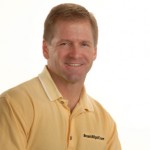Mind Control For Golf Improvement
You can use your mind to improve your golf game like you wouldn’t believe. Read these stories to see what unlimited potential and possibilities you have available when you learn the mental secrets these people knew.
During the late 60’s when the U.S. was at war in Vietnam, U.S. Air force col. George Hall, was a pilot who was shot down over Vietnam and captured as a prisoner of war where he spent 7 ½ years in p.o.w camp. Before capture, he weighed better than 200 pounds and was an avid golfer who had gotten himself down to a 4 handicap. The first thing he wanted to do when he was released was to play a round of golf. He was invited to the 1973 pro-am New Orleans PGA Open. And he shot a 76! After not having played golf for 7 ½ years, and losing a 100 pounds, he played to his handicap the first time out. After the round, some members of the press came up to him and asked him “so, was that beginner’s first time luck?” He says: “luck, I never 3-putted a green in the last 5 years!”
What was he talking about?
He spent those years in prison playing golf in his mind. Yep, it’s for real. The first couple years he reported that he replayed rounds that he had already played in his life prior to being captured. And then the next few years he played new rounds on courses that he knew and some that he didn’t.
Very powerful story, but it’s just a small example of the power of our human potential, which brings me to another p.o.w veteran, Col. Edward L. Hubbard also from the air force. He wrote a very inspiring book called Escape from the box. The Wonder of Human Potential. I had the extreme privilege to listen to him speak when he came to my home town. He’s a very powerful motivational speaker and he told us in person: “we have no clue as to the wonder of our human potential. It’s way beyond anything you have ever done” and the one thing that really struck me in his book and presentation is that he kept saying that he and everybody else in that camp were all average ordinary citizens, that they were not special in any way except that they accomplished extraordinary achievements simply because of the situation they were placed in.
Let me tell you about some of these achievements. For starters, when they first went into camp, they were not allowed to talk to each other so they had to learn this tapping code to communicate. They would tap a rock on the floor using a code to represent letters. The column would be the first tap and the row number would be the second tap. So if you tapped once, and then twice, then that would mean the letter “G”. If you tapped 4 times and then 3 times, the letter “O.” Oh yeah, C=K.
| A | B | D | E | F |
| G | H | I | J | K |
| L | M | N | O | P |
| Q | R | S | T | U |
| V | W | X | Y | Z |
They spelled out words and communicated to each other this way. In a cell next to col. Hubbard was Edward Alvarez, the first pow captured in that war. He taught col. Hubbard the Spanish language using this tap code. When col. Hubbard was released and made it back to the states, one of the first things he did was to enroll in a college Spanish class and he passed the final exam on his first day! So then he tells us about a lady in the audience of a different seminar who interrupted him when he told this story. She said: “I don’t believe you did that. I don’t think that is even possible, there is just no way you could have learned a language by tap code.” Right in front of everybody, he says: “lady, I did it, it’s completely true, there’s a hundred guys in that camp who will vouch for it, and I don’t care if you believe it or not, it’s your loss if you don’t. In fact, if you think that’s unbelievable, I know a guy who learned 4 languages by tap code and that’s just the beginning of things.”
They were able to teach each other classes in literature, math, physics, anatomy, and other subjects, all from their head, from their memory when they took this education before they were imprisoned. They were absolutely amazed at their own ability to recall this information that they had learned sometimes years before.
If that isn’t enough, they had phenomenal physical achievements as well. They used the power of incrementalism to do this. Col Hubbard said he made it up to jumping rope 3640 times. He was able to do 660 push-ups without stopping. 2,700 sit-ups without stopping. And they did it all on 300 calories a day in their diet! That’s less than most of us have for one meal. And you think it’s hard to get up enough energy to exercise after a day at the office? Hah! Incremental improvement and competition is what they give the credit to for that. Incrementalism is where you’re doing just a little bit more every single day and over time it becomes a great feat.
The competition they had between each other spurred them on as they made little bets on who could do the most jump ropes in one day for example. These guys would absolutely laugh at you if you said you couldn’t break the score of 80 in this game of golf where you hit a ball that’s not even moving! After their experiences, they’d probably tell you they could shoot par within a year of taking up the game! The Japanese language has a similar term, Kaizen that means continuous improvement, or always getting just a little bit better just like incrementalism. I have the Japanese symbol for Kaizen on a board hanging on my wall that my former boss gave me as a going away gift when I left my job as a Fedex manager. It reminds me of this principle every day.
There are so many people out there like them that do not accept limitations and you shouldn’t either.
About the author: This is article is just a snippet from the great product called Break 80 Without Practice by Craig Sigl. For years Craig struggled to break 80 like  so many amateur golfers. After throwing his clubs in the corner of his garage and giving up, he discovered golf’s secrets that changed his life and renewed his game. A year later he scored 77 on a championship course. He then went on to drive his handicap down to a 5, make a hole in one, and record his first under par round…all without practicing. He is now a mental toughness trainer and teaches his methods to golfers worldwide. To learn more about breaking 80 without practice go here now.
so many amateur golfers. After throwing his clubs in the corner of his garage and giving up, he discovered golf’s secrets that changed his life and renewed his game. A year later he scored 77 on a championship course. He then went on to drive his handicap down to a 5, make a hole in one, and record his first under par round…all without practicing. He is now a mental toughness trainer and teaches his methods to golfers worldwide. To learn more about breaking 80 without practice go here now.

